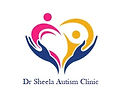Hyperactivity ADHD Homeopathy Treatment in Chennai
- Dr Sheela Homeopathy Clinic Chennai
- Oct 23, 2024
- 4 min read
Updated: Feb 18, 2025
#adhdhomeopathy #adhdhomeopathyclinic #adhdomeopathytreatment #adhdhomeopathydoctorinchennai #adhdhomeopathicclinicinchennai #adhdhomeopathictreatmentinchennai #hyperactivityhomeopathy #hyperactivityhomeopathyclinic #hyperactivityhomeopathytreatment #hyperactivityhomeopathydoctorinchennai #hyperactivityhomeopathicclinicinchennai #hyperactivityhomeopathictreatmentinchennai
Understanding Hyperactivity Disorder in Children: Insights and Strategies
Hyperactivity ADHD Homeopathy Treatment in Chennai
Hyperactivity in children can be both a perplexing and challenging experience for parents, teachers, and caregivers. While all children exhibit moments of high energy, there’s a significant difference between typical childhood exuberance and the sustained, excessive restlessness that characterizes hyperactivity.
What is Hyperactivity?
Hyperactivity refers to a pattern of excessive physical movement, impulsiveness, and an inability to stay still or focused. It is often one of the key symptoms of Attention Deficit Hyperactivity Disorder (ADHD), although not all hyperactive children have ADHD. Hyperactive children often struggle with sitting still, following instructions, and staying on task. This can impact their school performance, social interactions, and even family dynamics.
Key Characteristics of Hyperactivity
Excessive Movement: Children may fidget, run, or climb in situations where it’s inappropriate.
Impulsivity: They may interrupt others, speak out of turn, or have difficulty waiting for their turn.
Difficulty Staying Focused: These children often struggle to pay attention to tasks, becoming easily distracted by their environment.
Restlessness: Many hyperactive children find it hard to remain seated during activities like meals or classes.
Hyperactivity can arise from several different sources. It’s important to understand that the causes are often multifaceted and may vary from child to child:
1. Genetics and Family History: A child’s genetic makeup plays a significant role. If there’s a family history of ADHD or other behavioral conditions, the child may be more likely to exhibit hyperactive behaviors.
2. Brain Development: Some children show differences in the structure and activity of the brain, particularly in areas responsible for attention and impulse control. These differences can lead to struggles with self-regulation and hyperactivity.
3. Environmental Influences: Environmental factors like high-stress home situations, poor sleep, inadequate nutrition, or even excessive screen time can exacerbate hyperactivity in children. Exposure to toxins such as lead or prenatal exposure to alcohol or tobacco can also impact behavior.
4. Developmental Stages: Young children, especially toddlers and preschoolers, naturally have a lot of energy. As they grow, their ability to sit still and focus generally improves. In some cases, what may seem like hyperactivity is simply part of normal development.
5. Medical Conditions: Certain medical conditions, such as sleep disorders, hearing or vision problems, or thyroid imbalances, can also contribute to hyperactive behaviors. If you’re concerned, it’s important to rule out underlying health issues.
If you suspect your child might be hyperactive, watch for these common signs:
Constant Movement: Hyperactive children often appear to be "on the go" at all times. They may fidget, squirm, or feel the need to move around even when it’s not appropriate (like during meals, in class, or while reading). They might have difficulty sitting still, even for short periods.
Impulsivity: Children with hyperactivity often act on impulse without considering the consequences. They may interrupt others, blurt out answers without waiting their turn, or make snap decisions that seem reckless.
Short Attention Span: While hyperactive children may start tasks with excitement, they often struggle to maintain focus, quickly jumping from one activity to another without completing them.
Difficulty Following Instructions: It can be challenging for hyperactive children to follow through on tasks or remember multiple instructions, often because they become distracted or bored quickly.
Excessive Talking: Talking a lot, interrupting conversations, or being unable to stay quiet in situations that require it (like during a lesson or movie) is another common trait of hyperactivity.
Difficulty Relaxing: Relaxing or participating in quiet activities, such as reading or drawing, can be difficult. Instead of enjoying calm play or reflection, they may seem agitated or restless.
Hyperactivity disorder in children can be challenging, but with understanding and the right strategies, it’s possible to help children thrive. By recognizing the characteristics, causes, and effective management techniques, parents and caregivers can support hyperactive children in navigating their daily lives. If you have concerns about your child's behavior, don’t hesitate to seek professional guidance for tailored advice and support. Together, we can help children with hyperactivity develop the skills they need to succeed.
Hyperactivity ADHD Homeopathy Treatment in Chennai
Frequently Asked Questions:
What are the common signs of hyperactivity?
Common signs include constant fidgeting, running or climbing in inappropriate situations, excessive talking, interrupting others, and difficulty waiting for turns.
What causes hyperactivity in children?
Hyperactivity can stem from various factors, including neurodevelopmental disorders (like ADHD), environmental influences, sensory sensitivities, and individual temperament.
How is hyperactivity diagnosed?
Diagnosis typically involves a comprehensive evaluation by a healthcare professional, including behavioral assessments, questionnaires, and interviews with parents and teachers.
Is hyperactivity always a sign of ADHD?
Not necessarily. While hyperactivity is a key symptom of ADHD, some children may be hyperactive without having ADHD. Other factors or conditions could contribute to hyperactive behaviors.
How can parents manage hyperactivity at home?
Strategies include creating a structured routine, encouraging regular physical activity, setting clear expectations, using positive reinforcement, and providing quiet time for relaxation.
What role does diet play in hyperactivity?
Some studies suggest that certain foods or additives may affect behavior in some children. A balanced diet is generally recommended, and monitoring food intake may help identify triggers.
When should I seek professional help for my child’s hyperactivity?
If hyperactivity significantly impacts your child's daily functioning, social interactions, or academic performance, consulting a healthcare professional is advisable






